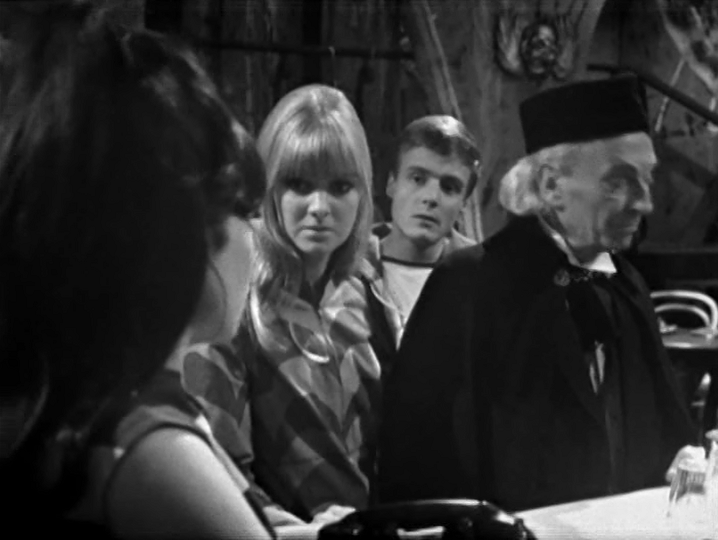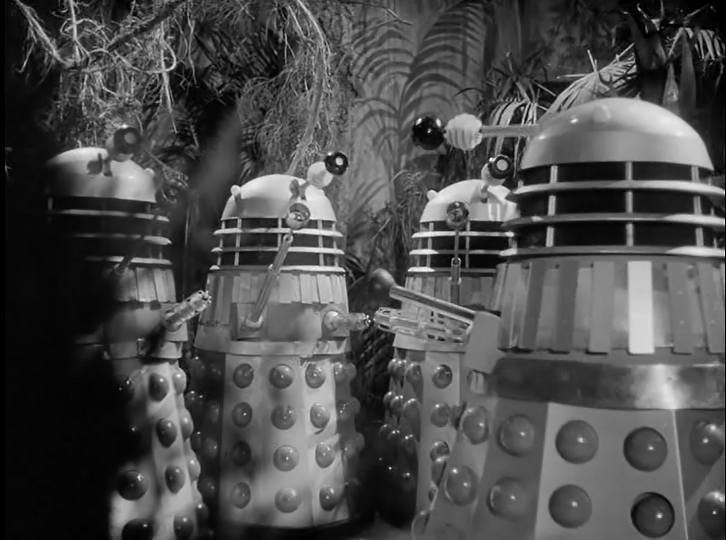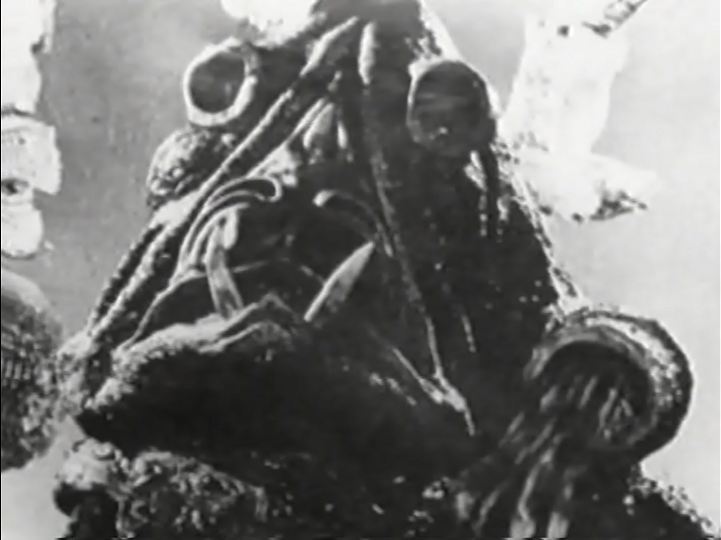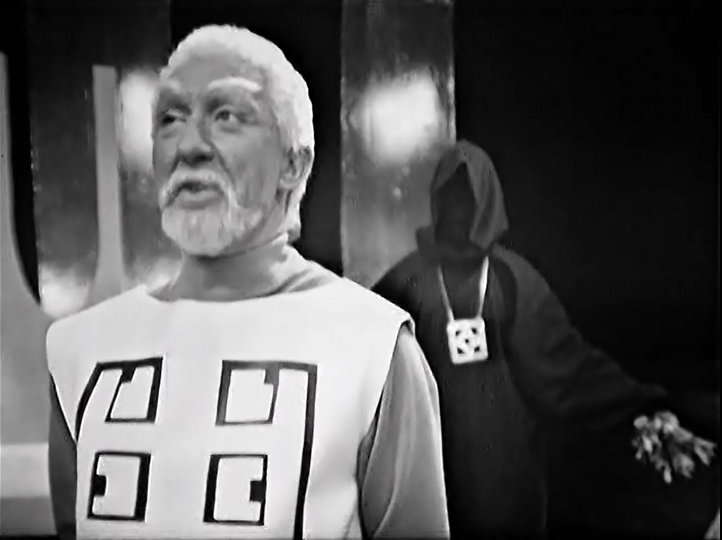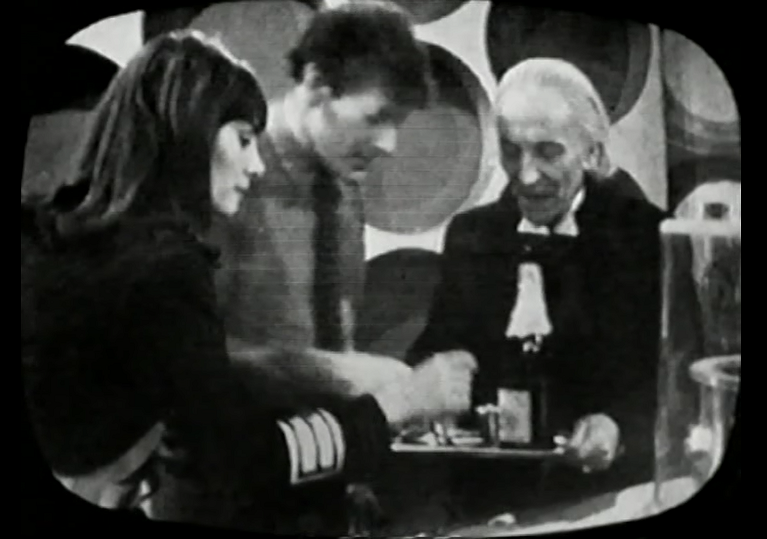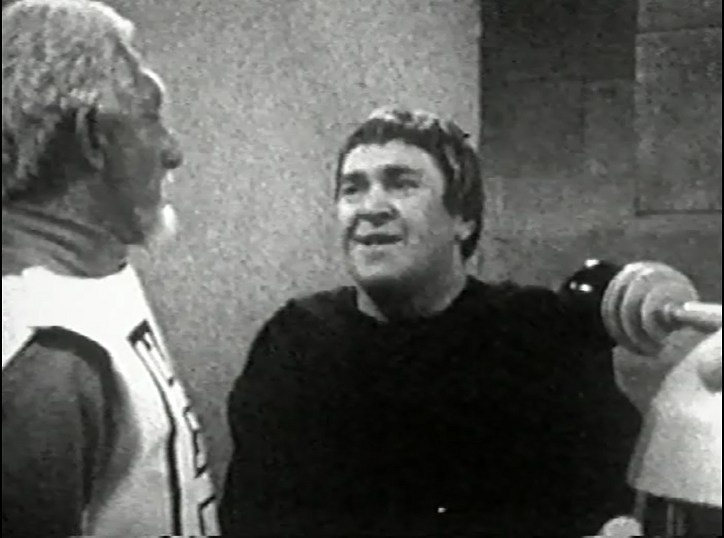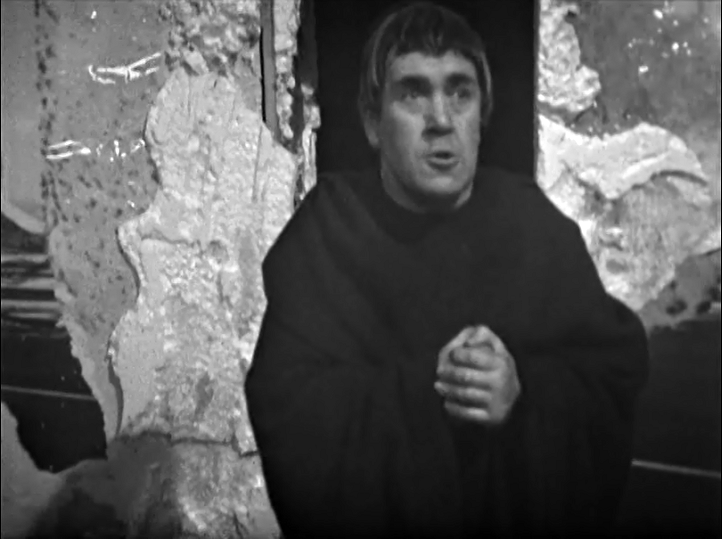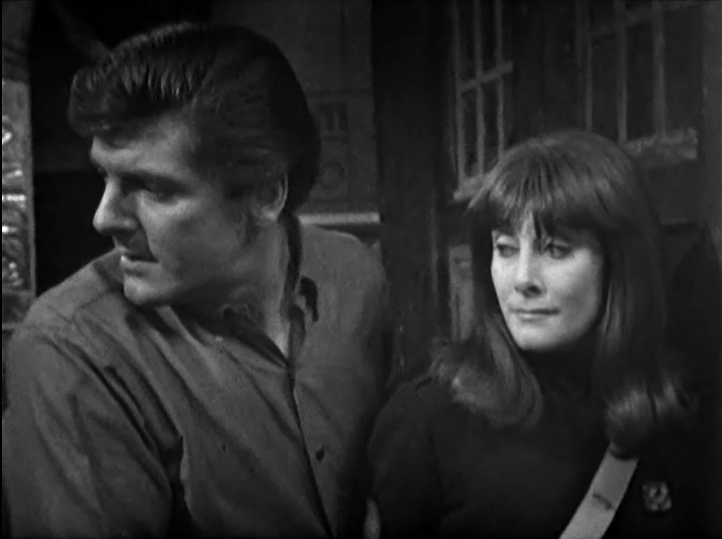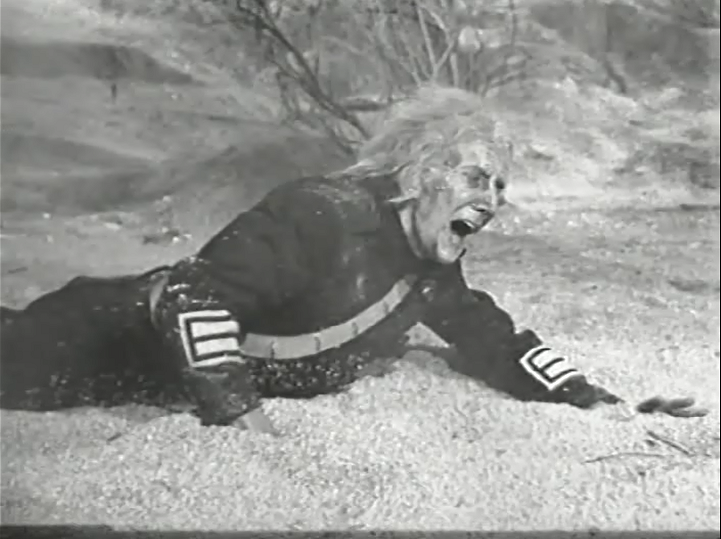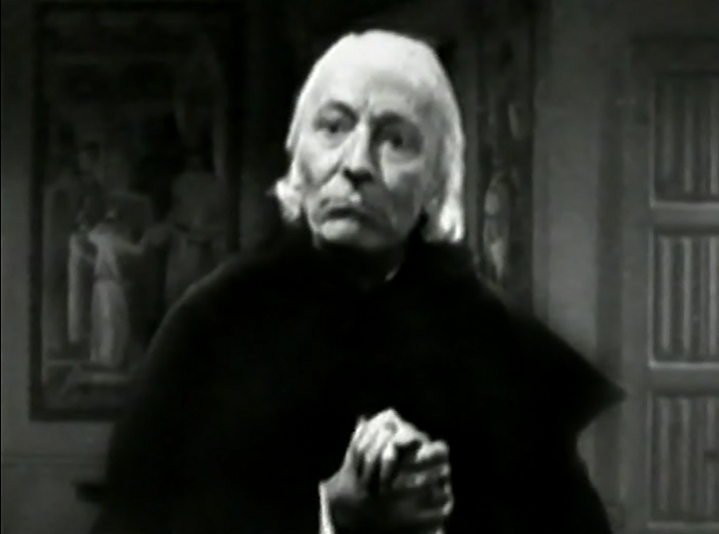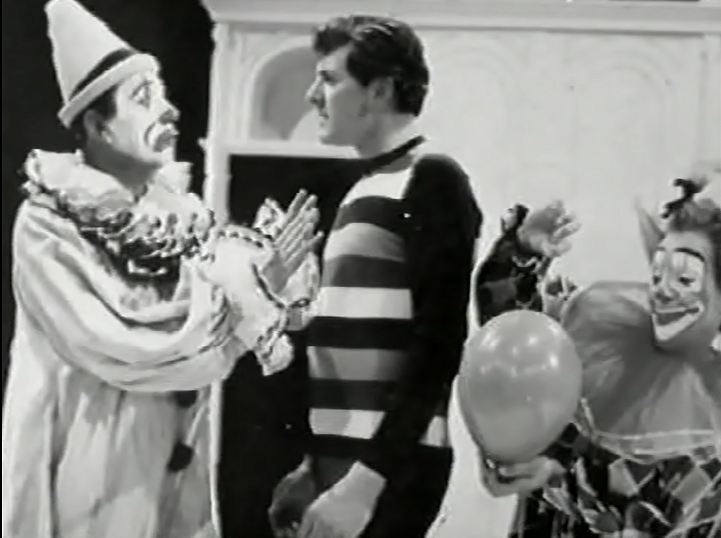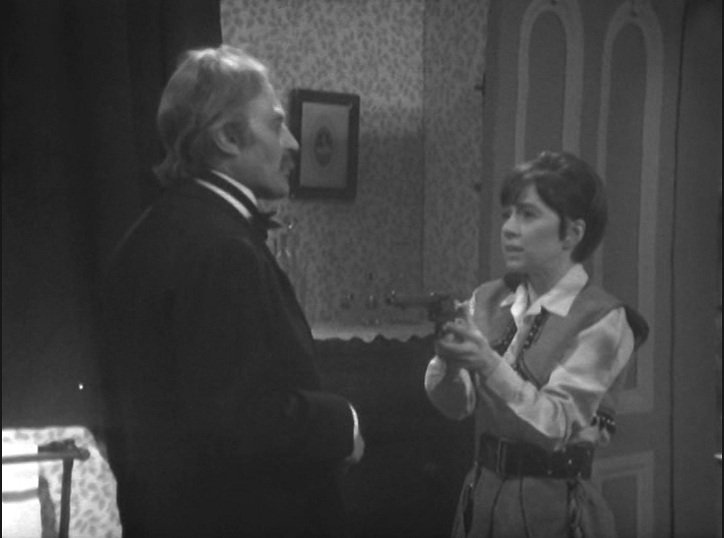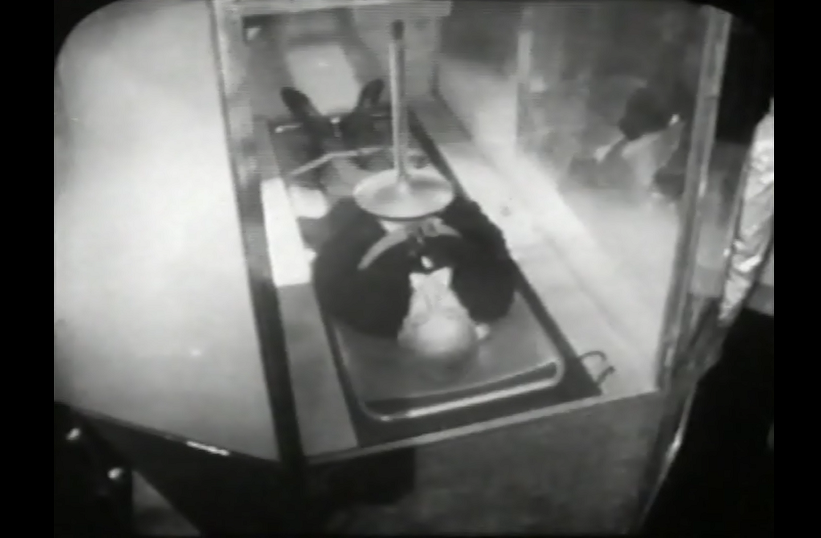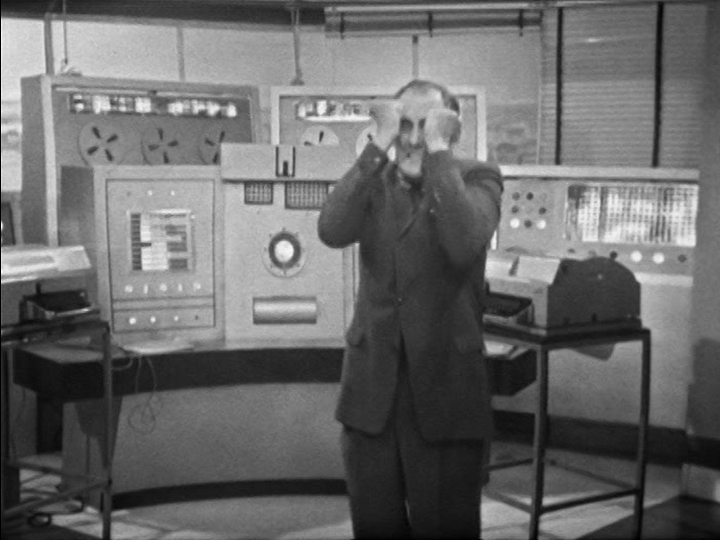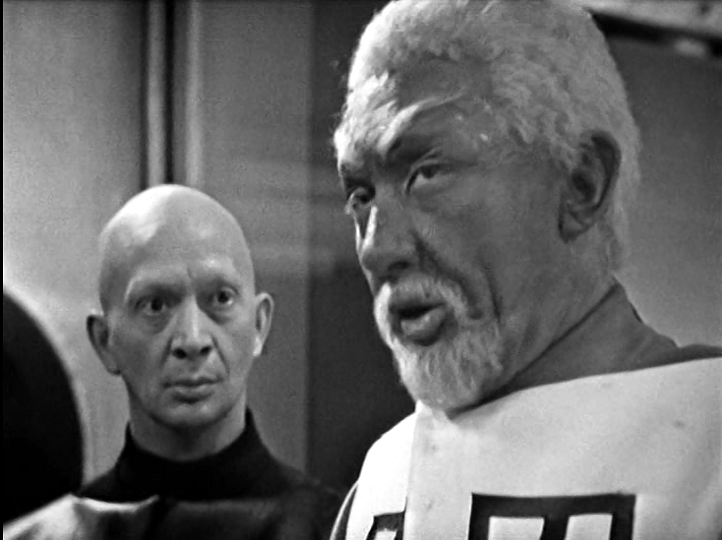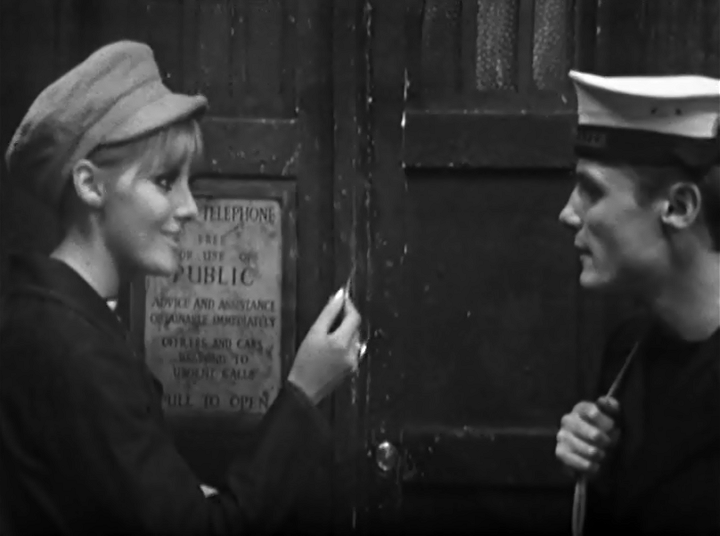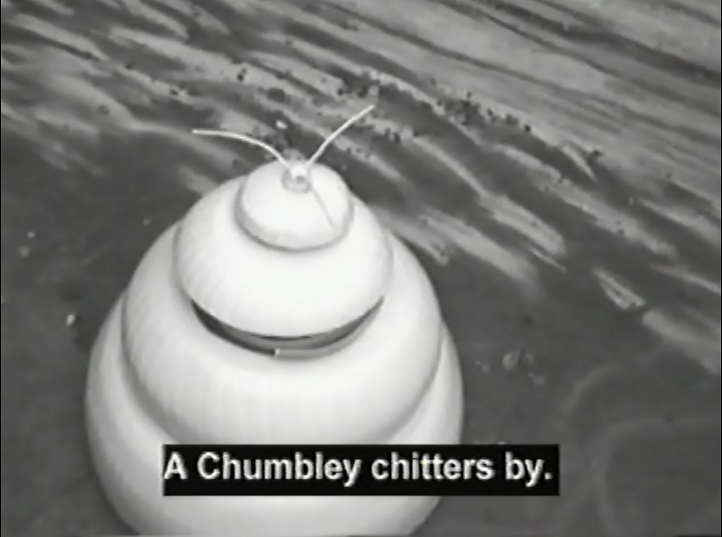055: SoraRabbit Watches: Doctor Who Season Three
Welcome back to my ambitious recap and review of the entire series of Doctor Who! I’m sorry this one took a while to get to… I slowed way down in my viewing, which I’ll talk about a bit later. This season was kind of rough, but it was still enjoyable and altered the course of the series. In case you missed either of my previous recaps, you can find them here:
Doctor Who Season 3 aired on BBC from 1965 to 1966 and consisted of 45 episodes over 10 serials. This season was hit very hard by the purging that I talked about in my previous posts. Out of the 45 episodes, only 17 remain intact. The remaining 28 episodes had to be reconstructed using set photos, audio recordings, tele-snaps, and some cinematic acrobatics. For most of these missing episodes no tele-snaps or publicity photos exist. A scene was recorded here or there, and of course the audio was retained, but the rest of the episodes had to be cobbled together differently from the previous season's lost episodes. They used whatever they could: existing publicity photos, stills from other episodes, brief animations, and re-filmed segments by a production team called Loose Cannon.
As always, I will summarize and talk about each serial, but not give a full recap. That said, spoilers follow.
The Doctor ponders. (Credit: BBC TV)
I won’t get too deep into explaining the premise of the series, as I talked more about that in the other posts. As a refresher, Doctor Who is a long-running science fiction television program that follows the adventures of the Doctor, an alien being from an advanced society who travels about in a time machine with a rotating cast of companions, most of whom end up being human. He also has the ability to regenerate into new bodies, something that hasn’t happened at this point in the series.
In my watching of this series, I’m doing the best I can to avoid spoilers or any info from later episodes. It’s impossible to avoid everything as I research though, so I purposely leave out details I happen to know and write these posts from the point of view of a newcomer.
This is also a good place to mention something I didn’t get into in the previous posts. Doctor Who is a vast multimedia property. Along with the TV shows there are movies, comic books, novels, and audio plays. For the purpose of these posts I am strictly sticking to the canon set forth in the television show, the associated specials and the 1996 television movie. This keeps me focused and prevents confusion. It also means that there is much, much more out there if you get the urge to explore it. The creators and crew of Doctor Who have notoriously been flippant about canon, stating that anything and everything can be a part of the canon of the series. (It makes sense if you bring in alternate timelines and such.) This means that there are mediums out there that contradict the things I state in these posts. Two good examples of this: I state that Vicki’s last name is never revealed, but in a novel it is stated to be Pallister. Also I state that the Monk only appears in two serials, but he also appears in novels, comics, and extensively in audio plays. (Even regenerating into new bodies like the Doctor!)
So yeah, although we may be missing out on some fun stuff, to keep this train on the rails I’m sticking to the TV show. Just the thought of coming up with a comprehensive chronological history of the character including all official released material makes my head hurt. That’s a job for someone much more organized than me.
The Doctor looks snazzy in hats. (Credit: BBC TV)
The Doctor is the titular character. He is a mysterious traveler through time and space, fascinated with science and technology, and a magnet for trouble. The Doctor is snippy, intelligent, and eccentric. The Doctor can be self-absorbed, impatient, and easily annoyed, but he does care a great deal about those who are in his charge. Other than that, not much is known about him, but every season seems to give us a few insights into his inner workings. I will put those near the end of the post. He travels about in an advanced machine called the TARDIS, which is permanently stuck in the shape of a police box.
One the many iterations of the TARDIS crew this season. (Credit: BBC TV)
Much of the focus of the series is on the Doctor’s travelling companions rather than the Doctor himself. I can’t actually get a group shot of the TARDIS crew this time, as the companions shift much more rapidly than before. You’ll see what I mean as we continue. This season has the longest list so far. There is some debate among fans as to who should be on this list. My own point of view is that anyone who travels with the Doctor in the TARDIS, regardless of the duration can be considered a companion. The companions featured in this season are as follows:
Vicki: Vicki was a continuing companion from Season 2. She is very intelligent and good at technology. She has an optimistic view and is empathetic. She is very young, but is mature.
Steven Taylor: Steven was also from Season 2. Originally he was depicted as rash and argumentative. He has calmed down a little since then, becoming a bit more careful. (Possibly due to nearly dying this season.) He also argues less with the Doctor, having come to rely on the cranky old man and respect him. (Although they still butt heads at times.)
Katarina: This young woman was a handmaiden from Troy. She believed the Doctor a god and the TARDIS limbo. She was convinced she was dead and travelling to the afterlife. She took Vicki's place briefly. She was soft-spoken and agreeable.
Sara looking stiff and stuffy. (Credit: BBC TV)
Sara Kingdom: Sara was a member of the Space Security Service on Earth in the year 4000. She fell in with the Doctor and decided to help fight against the Daleks. Sara was responsible and dedicated, putting duty above all else, including her own safety. Very serious and rarely joked around. She was adept at hand to hand combat.
Dodo is a weirdo. (Credit: BBC TV)
Dodo Chaplet: Dodo is cheerful, flighty, and a bit strange. She loves nature and animals. She is also a bit naïve and gullible. She speaks with poor grammar and slang, a trait that annoys the Doctor. Her real first name is Dorothea and it’s strongly implied she’s a descendant of a young French servant named Anne who Steven and the Doctor rescued in the 1500s.
The Doctor hangs out at a happening nightclub. No really. (Credit: BBC TV)
Polly: Polly is a young woman who worked as a secretary in London in 1966. She is very spirited, helpful, and is a little sassy. She has a light-hearted, teasing friendship with Ben. Although her surname was not spoken on screen, as is common with companions, ancillary material refer to her as Polly Wright.
Ben Jackson: Ben is a sailor who had a shore posting in London in the same time period as Polly. He speaks casually, with a cockney accent. Ben is quick to action and a little rash like the other male companions had been, although is a bit less courageous. (At least so far. That may change.) Although so far the companions have not been romantically involved, Ben appears to have feelings for (or at least an attraction to) Polly. He refers to Polly as “Duchess” in reference to the class differences between the two. (She’s more cultured and he’s working class.)
Dalek meeting. (Credit: BBC TV)
The Daleks: Arguably the Doctor’s greatest adversaries (at least to date) the Daleks are a race of ruthless aliens with the ability to travel through time and space and aspirations of universal domination. The Doctor has encountered them in various timeframes and always manages to derail their plans of conquest. They care nothing for people other than their own race, except when using them as tools for their plans. Although they appear to be robots, that is just their outer protective shells. Inside they are small squid-like creatures. (From what I can tell… they haven’t actually been clearly shown yet, although this season the Doctor does find a Dalek corpse.) In this season, the black Dalek was confirmed to be the Dalek Supreme. (This may have been stated in Season 2 and I just missed it.) They speak in a stilted robotic manner.
Our old pal the Monk. (Credit: BBC TV)
The Monk: The Meddlesome Monk is the third member of the Doctor’s so far unnamed species that we have met. (The second being the Doctor’s granddaughter Susan who departed last season.) Rather than using his time travel technology to explore and accumulate knowledge and experiences, the Monk prefers to seed chaos and artificially advance primitive people’s technology and society. He appears to do this just for fun. In their last encounter, the Doctor had stranded the Monk on Earth in 1066. This left the Monk with a vendetta against the Doctor. The Monk, while devious, dislikes confrontation and is a bit bumbling and cowardly, hiding behind trickery and technology.
The reconstructions are helpful. (Credit: BBC TV)
Season 3 began with the first serial, “Galaxy 4”. This serial runs from Episode 82 to 85. This entire serial was missing and had to be reconstructed in a manner similar to the previous season’s missing episodes. (Although in the lists I’m referencing, episode 3 is said to have been found, I did not have a copy of it and had to rely on the reconstructed version.) A behind the scenes tidbit: these episodes were originally written with Ian and Barbara still as companions, so most of their lines had to be repurposed for Steven, making his characterization seem off.
I love the name “Chumbley”. (Credit: BBC TV)
The Doctor and his friends land on a silent planet that appears to have nothing living on it. Investigating the quiet planet they find it has flowers and three suns. A robot bumbles by and Vicki calls the robot Chumbley, trying to describe how it moved. The Chumbley has no speech mechanism and seems to be blind, but can hear them. It also has a gun that it threatens them with, leading them off somewhere.
They are saved by the Drahvins from Galaxy 4, blonde women who throw a magnetic net on the Chumbley. They want to take them to their leader and save them from dangerous aliens called the Rill. More Chumblies appear and they all run away. They meet with the Drahvin’s leader, another blonde woman celled Maaga. They instantly don't trust Maaga. She refers to them as prisoners and reveals many plot points. She explains that the planet will explode in 14 dawn's time, per the Rill. The Drahvin were attempting to colonize the planet but they crashed, rendering their ship unusable. They're mostly women. They keep as many men "as they need" and the rest they kill. According to Maaga men consume valuable food and fulfill no particular function. (Harsh, but fair.) The Rills have offered to help, but Maaga has refused to listen, considering them untrustworthy and dangerous. She says they killed one of the Drahvin in cold blood. Maaga’s plan is to steal the Rill’s ship and escape the planet before it explodes… if it really is going to explode. The Doctor volunteers to find out if the Rills are telling the truth about the planet. Maaga demands one of them stay behind, so Vicki volunteers.
I think this is a pop group reunion. (Credit: BBC TV)
Back at the TARDIS, the Doctor confirms the planet will explode, but not in 14 dawns. They only have two! Their new plan is to save Vicki and escape, warning the Drahvin that they have much less time than they thought. Before they can do anything, The Chumblies return and try to blow them up. They are unable to damage the TARDIS because of its shielding.
Back at the Drahvin ship, the Doctor lies to Maaga about the timeline of the planet. The Doctor refuses to help them capture the ship since that would mean the Rill would die. Maaga pulls a gun and Steven tries to stop her but is overpowered by the soldiers. Maaga realizes the Doctor is lying and when she threatens Vicki he tells the truth.
Steven stays behind this time and the Doctor and Vicki go off to capture the Rill's spaceship. The Doctor had noticed the Drahvin's ship was weak and if the Rills really wanted to destroy them they easily could, so Maaga may not be right about them. Steven discusses the class differences with the soldiers. Maaga eats better, has better guns, etc. She treats them horribly and lords over them, but it’s their place in life.
Back at the Rill’s ship, they discover the Rills have a drill and air purifier and the Doctor is impressed by how advanced they are. A Rill appears and they run, not seeing it clearly. Vicki is trapped and she goes off with a Chumbley, leaving the Doctor to tinker with the air converter. He doesn't want to disconnect it because he believes they have to breathe the ammonia that it’s pumping out. Maaga is planning on running off with the Rill ship and leaving the Doctor's crew and the Rills behind to die. She gets all horny over the thought of them abandoned on an exploding planet. The Rill speaks through the Chumbley (even the Rill accepts the name Chumbley, which I found amusing.) It explains that they offered to take the Drahvins off planet and didn't kill one of them as Maaga claimed. Much like Greedo, the Drahvins fired first. (That was a joke, don't flame me in the comments, please.) The Rills tried to help the injured soldier but Maaga appeared with a gun and they ran. They saw Maaga kill the soldier herself. The Rill won't show himself to Vicki because she would find him grotesque, and because they need to breathe the ammonia, which would be dangerous to the humans.
Steven overpowers his guard but is stopped by a Chumbley and hides in an airlock. The Rills were drilling to try and power up their ship, but can't convert the gas. The Doctor volunteers to help and uses the TARDIS to jumpstart the ship. There are only four Rill left, 8 died in the crash. Maaga drains the air from the air lock, putting Steven at risk. The Chumbley reports back and the Doctor, Vicki, and more Chumblies rush off to save Steven. They of course get there in the nick of time. The Rill state that in trying to kill Steven the Drahvin have gone too far and the time for pacifism is over. If they are seen outside their ship again, they will be killed. Maaga still plots against them, planning now to destroy the Rill ship so no one can escape.
The Doctor and friends recharge the ship just in time to escape and get to see what the Rills look like. They accept them as intelligent, compassionate beings. Unable to damage the Rill ship, Maaga decides to steal the TARDIS but are too late. They are left behind on the planet that is about to explode. Since the Drahvin couldn't get over their bias, they were left behind to die.
After dematerializing, Vicki looks at a planet, wondering what's going on there. (Which is an awkward segue.) We see an astronaut awaken in a jungle saying that he must kill and the episode ends.
I think the Rills are pretty. (Credit: BBC TV)
This serial was interesting. It was nice to see them break away from their overused trope of oppressive alien species being rebelled against. The show was in danger of becoming stale and so it’s great to see them trying new things. With this story they had a nice juxtaposition of expectations. The attractive, slim blonde women were evil and manipulative, while the grotesque inhuman creatures were gentle and compassionate. I know it’s been done, but here it was well-executed and subtle. As with many serials it probably would have done better as a three-parter. It would have saved a lot of padding as they moved back and forth. Still, Galaxy 4 was a solid tale of bias and classism, giving us a strong start to the season.
Dalek drama. (Credit: BBC TV)
The second serial was Episode 86, “Mission to the Unknown”. Yes, you read that right. This is a unique serial, as it only contains one episode and does not feature the Doctor, his companions, or the TARDIS. This episode was also missing. The idea behind this episode is that last season’s “Planet of the Giants” was cut down by one episode so they had another episode to produce contractually. (This serial and the last were part of their second production block.) They decided to add this one in as a prelude to the massive 12-part epic they were planning later in the season.
What is this, the Cantina? (Credit: BBC TV)
This one takes place after the Daleks invaded Earth in Season 2. On the jungle planet showed in the cliffhanger of the previous serial, a man named Garvey is standing up and repeating the word “kill”. Two more men are engaging in some drama about the fact that they’ve landed on a hostile alien world. These men are Marc and Gordon. Long story short, Garvey tries to kill them and has to be shot with a laser gun. The poor sap was pricked by a plant creature called a Varga. Marc, who landed them on the planet, is secretly a member of the Space Security Force and has a license to kill. See, the Daleks had been sighted in the Solar System (and get used to them referring to that) and the Varga plants come from Skaro, the Dalek’s home world. The Daleks hadn’t been heard from in a thousand years, but the humans are still on guard. As Garvey’s body turns into a Varga, Marc realizes that they won’t have time to fix their ship and get off the planet before they’re discovered by the Daleks. He plans to launch a recorded message on a rocket to warn Earth, but he doesn’t get around the launching it before the Daleks destroy their ship and Gordon is stuck by a Varga spine. Marc kills Gordon and is exterminated by the Daleks before he can launch his message. The Daleks reveal their plan— they will work together with seven alien representatives of other planets to conquer all the planets in the Solar System, finishing with Earth.
Not much to say about this one, but I do find it interesting that they padded out their production block with a single episode outside of their usual serial format.
The Trojan horse. (Credit: BBC TV)
The third serial, “The Myth Makers”, ran from Episode 87 - 90. All four episodes of this serial were missing as well. This one focuses on the siege of Troy and the Trojan Horse, using the Odyssey as the basis.
They look like they’re hugging but I guess the subtitles are right? (Credit: BBC TV)
Landing near Troy, the Doctor distracts a battling Achilles, allowing him to kill his opponent, which irritates the Doctor. Since the Doctor appeared suddenly and helped him slay his enemy, of course Achilles thinks he’s the god Zeus. Oddyseus doesn’t believe the Doctor is Zeus, instead thinking he’s a Trojan spy. They lead the Doctor away and Steven goes off to find him. He leaves Vicki in the TARDIS, as her ankle still hurts from their adventure in the Galaxy 4 serial. Steven is tracked by Cyclops, a one-eyed man who works for Oddyseus. Steven is captured and they think he’s also a spy. The “Zeus Temple” (the TARDIS) is captured by the Trojans and brought to their city. When Vicki emerges from it, she tells them she’s from the future, which they assume means she’s a prophet. Everyone likes her (especially a guard named Troilus) except for the actual prophetess, Cassandra, who thinks she’s a Greek spy.
Meanwhile the Doctor and Steven have been convinced to help the Greek invade. Steven throws a fight against Paris and is taken into Troy. When Vicki and Steven clearly recognize each other, they’re both imprisoned as spies.
Yay swords! (Credit: BBC TV)
After a few failed attempts (including a flying machine), the Doctor introduces the idea of the Trojan horse, which Odysseus thinks is a great plan. This plays out in the familiar way, with the horse being brought into the city. Meanwhile Vicki has fallen for Troilus, who returns her affections. Vicki escapes and Cassandra sends her handmaiden Katarina after her. Vicki sneaks back and rescues Steven. Although Steven pokes fun at Vicki for her crush, he does warn her to tell Troilus to get out of the city before nightfall. Vicki is caught and left with Katarina to guard her.
The city is invaded by the Greek soldiers and outside the walls, Troilus battles Achilles, killing him. Vicki wins Katarina over and convinces her to go find Steven. Vicki reunites with the Doctor, telling him she’s decided to stay with Troilus and help to rebuild Troy with her new identity of Cressida. The Doctor reluctantly allows her to stay. Steven is wounded in battle with a Trojan soldier. Katarina helps him into the TARDIS. The Doctor is confronted by Odysseus, who sees the TARDIS disappear. He wonders if maybe the Doctor was Zeus after all.
Vicki meets up with Troilus outside the city. He at first thinks all the misfortune and the loss of the city were Vicki’s fault, but they proclaim their love for each other. As a side note, Vicki is apparently 16, or possibly younger. I assumed she was in her twenties, but maybe I forgot some reference to her age in Season 2. In one exchange with Troilus he mentions he’s almost 17 and Vicki says that's hardly any older than her. I just thought that was weird.
On board the TARDIS, Steven is hallucinating and near death. He doesn’t understand that Vicki stayed behind. As for Katarina, she still believes that the Doctor is Zeus, the TARDIS is limbo, and that they’re all travelling to the afterlife. The Doctor can’t convince her otherwise. The Doctor hopes that wherever they land next will have the medicine Steven needs. (Even though we’ll later see that the Doctor had plenty of medicine in the TARDIS’s cabinet.)
A happy ending I guess? (Credit: BBC TV)
So that was the end of Vicki’s story and the introduction of her replacement, Katarina. I think it was a sad and unfair ending for Vicki. It felt too rushed. There were only a few scenes between her and Troilus so there wasn’t much basis for them to be in love. Plus Vicki really didn’t seem that into him, so it was just strange altogether. The character deserved more than to be shuffled away like that. This serial also had strange off-key music, but that may have just been issues with the audio recording used in the reconstruction.
What I liked about this serial is that it contains a paradox, although this concept is not explored in the story. The Doctor, Steven, and Vicki all know about the Trojan Horse from Homer’s story The Odyssey, but the Doctor is the one who gives this idea to the Greeks. Just another example along with the burning of Rome that links the Doctor in with human history. For someone who doesn’t believe in interfering with history, he sure is shaping a lot of it.
Evilevilevil. (Credit: BBC TV)
The fourth serial, “The Dalek’s Master Plan” ran from Episode 91 to 102. (Wow, check us out— we’re over 100 episodes!) This is so far the longest serial we’ve come across, clocking in at 12 episodes. (13 if you count the prequel we talked about earlier.) Only 3 of the 12 episodes are intact.
The Doctor and Katarina. (Credit: BBC TV)
This serial takes place in the year 4000. (Which so far is the furthest we've been in Earth’s timeline. I’m assuming anyway… we still don’t know what time period Steven came from, but I believe it is before Vicki’s time.) At the beginning of the serial we see the Doctor land on planet Kembel, which is the planet the ill-fated Earth crew landed on in Mission to the Unknown. (It’s apparently also part of the Solar System according to dialogue in the one-shot episode.) The Doctor sets off to find medicine for Steven and leaves him in Katarina’s care. Two more humans are on the planet searching for the missing crew. Their names are Bret and Kert. Bret finds the transmitter that Marc left in the previous serial.
We jump to Earth to see the headquarters of the Space Security Service. We learn that the Savior of the Universe, Mavic Chen is going on holiday. He is some sort of space politician who runs the Solar System. (And yes, they keep referring to it as the Solar System, carefully enunciating it so you can hear the capital letters.) They also mention some sort of pact of nonaggression or something. They’ve gone 25 years without any war, which is honestly pretty impressive and the dude does deserve a vacation after that.
Back on Kembel, Kert is killed by Daleks and Bret finds the Doctor. He holds him at gunpoint and takes his key. He gets into the TARDIS and tells Katarina that the Doctor wants her to fly him off the planet. She, of course, has no idea what’s going on or how to fly the TARDIS so she just looks at him blankly. Steven awakens and sees a pissed off Doctor on the scanner which tells him all he needs to know. Steven uses all his strength to knock out Bret. The Doctor ties him up and wanders off again. When he comes to, Bret convinces Katarina to give Steven some medicine that he had in his pocket. This helps Steven to recover.
Mavic Chen is basically a super villain. (Credit: BBC TV)
A ship lands and the Doctor sees that the Daleks are aboard, which horrifies him. We learn that Mavic Chen is working with the Daleks, planning to conquer Earth and the rest of the Solar System using a plan called Project Inferno. We soon learn that Chen is working more closely with the Daleks than the rest of the alien space committee, and that he hopes to get control over more than the Solar System. We also learn that the Daleks, unsurprisingly, plan to eliminate Chen once he’s served his purpose.
The Doctor can’t return to the TARDIS because the Daleks have found it. He does meet up with his friends, who explain that Bret actually isn’t such a bad guy and he helped them get away. He returns and they argue. Bret thinks they have to return to Earth to warn them, and the Doctor believes they need to stop the Daleks now. This is where the Doctor has his craziest plan yet. He puts on the Sith robes stolen from one of the alien delegates and infiltrates the meeting, learning the Dalek's plans.
The variety of the aliens on the delegation was cool. They all looked, talked, and moved differently, which was a nice touch. The Doctor learns the Daleks are going to use something called the "Time Destructor", which is just what it sounds like. Chen has given them the power source for the device, which is a rare mineral called taranium. The Doctor steals the taranium and runs for it, almost getting left behind by Bret who’s about to launch himself, Steven, and Katarina into space in Chen’s ship. The Daleks are understandably pissed. The mineral can only be mined on the planet Uranus and takes 50 years to mine, which is why they needed Chen’s help so badly.
The Doctor gets back to the ship at the last second and they escape. This is where the Daleks speak my favorite line of the series so far. "All is ready for their space extinction!" This brings to mind a running joke between me and Cocoa, where we add space to something to make it sound all sci fi. Like space sports or space pants.
Last known photo. (Too soon?) (Credit: BBC TV)
On the way back to Earth they listen to Marc’s message and wonder if others on Earth are involved in the conspiracy. The Daleks, unable to destroy the ship for fear of losing the taranium, cause it to crash on planet Desperus, where a bunch of dangerous convicts live. As they’re fixing the ship, three convicts try to hijack it. Two are knocked out by the Doctor’s electricity trap and the third slips aboard unnoticed since the Doctor forgot to close the airlock. He send Katarina to close it and she’s held at knifepoint by the convict, Kirksen. He demands that they take him to the nearest planet or he’ll kill her. The nearest planet, of course, is Kembel and they warn him that it’s chock full of Daleks. He doesn’t care.
They swerve the ship, making him lose his balance and as they’re trying to talk Kirksen down, Katarina abruptly opens the airlock, blowing both her and Kirksen out into the vacuum of space, where they die. This was a shock, since this is the first companion we’ve lost to death. Was she trying to stop them from going back to the Daleks? Defending them from the intruder? Or was it a mistake since she doesn't understand technology? It's left ambiguous. Steven believed it was an accident, while the Doctor believed she sacrificed herself for them. He has a tender moment of sadness for her. "I shall always remember her... as one of the daughters of the gods."
Anyway, stuff happens and the crew are back on Earth. It turns out that Karlton, the bald head (haha that pun actually wasn’t intentional) of the Space Security Service is actually working with Chen, proving Bret’s fear of a conspiracy to be true. He has assigned his best agent, Sara Kingdom to the case to get the tararium back. Bret’s friend Daxtar is also working against them and Bret quickly kills him, which irritates the Doctor. Bret hatches a plan to alert the authorities to what’s going on in the Space Security Service, but before they get too far, Sara shoots and kills him. RIP Bret.
“Incidentally, a Happy Christmas to all of you at home.” (Credit: BBC TV)
As Steven and the Doctor run from Sara, they get caught in a Molecular Dissemination experiment. (It’s a teleporter. Let’s just call it a teleporter.) They are sent off to planet Mira with Sara, who Steven disarms. After some difficulty they win her over to their side and she reveals that Bret was her brother. This episode has my second favorite Dalek quote: "You make your incompetence sound like an achievement."
On Mira they find themselves surrounded by invisible eight foot tall aliens called Visians. The Daleks arrive and the Doctor realizes that they’re in double danger now. Chen and Karlton are conspiring to blow up Kembel and Karlton is worried that the duplicitous Chen will rule the Solar System himself. While the Daleks are battling the Visians, the Doctor and friends blind a Dalek with mud and steal their ship. The Doctor decides to create fake taranium and Steven just about kills himself charging it. After some trickery and a force field that Steven accidentally created, the fake taranium is in Chen’s hands and the crew have fled to the TARDIS, escaping. The Visualizer is broken and the Doctor says the readings show the air outside is poisonous. (This just turns out to be normal pollution, but the Doctor says Steven and Sara are not used to that level of pollution in their time periods.)
Episode 7 has nothing really to do with the rest of the serial because it aired near Christmas and they didn't want anyone to miss part of the story. This episode takes place in 1960s London and then Hollywood. They land at a police station and then on a film set. In the ensuing chaos they meet Charlie Chaplain and Bing Crosby. Really I’m not going to bother breaking this one down. It was an annoying episode. It went nowhere, there was a lot of yelling, and it wasn't even funny. There were a few weak attempts at jokes that fell flat. The only thing I liked about this episode was that the Doctor was mistaken for a professor, an expert of Arab culture and at the end of the episode the Professor showed up, looking very much like William Hartnell. That got a chuckle out of me.
Although this one is forgettable I suppose I should mention that this is technically the very first Doctor Who Christmas episode, which is something they did more of later on in the series. Weirdly, at the end of this episode, the Doctor breaks the fourth wall, looking at the camera and wishing the viewers a Happy Christmas. It was so disorienting. (Does he know his reality is in a TV show?)
The Monk joins the serial. (Credit: BBC TV)
Luckily the next episode is back to the story. The Time Destructor of course doesn't work because the Doctor replaced the taranium with a fake. The bad guy is shocked by this. He cries, "No! It came from Uranus!" (No, seriously. This is exactly what he said. Did… did Doctor Who invent that joke?)
Anyway, as the Doctor and his friends are trying to get back to Earth in the correct time period (which, if you’ve been paying attention to how the TARDIS works, is not very likely) and the Daleks have sent away for their own time machine from Skaros. They land on a newly-formed volcanic planet called Tigus with another time machine close behind. That time machine happens to be another TARDIS, piloted by someone we know.
That’s right, the Monk has returned for revenge. He explains that he managed to bypass the Dimensional Control so he could get back in his own TARDIS. (Which is disguised as a boulder since his TARDIS’s chameleon circuit is functional.) His revenge entirely consists of sabotaging the TARDIS’s lock so that the Doctor and his friends will be stranded on this planet forever. The Doctor quickly uses his ring to reflect the sun's rays and open the lock. When Steven asks what properties the stone in the ring has, the Doctor changes the subject. (He's been pretty shady about his ring, which just makes me more curious.)
The Monk follows them to Egypt where they encounter the Daleks in their own time machine. The Daleks kill some Egyptians and some others kidnap Steven and Sara, thinking they’re looters. The Monk encounters the Daleks, revealing he knows about them. Chen enlists his help to get the Doctor, saying they’ll spare the Monk’s life if he helps. He quickly agrees to these terms.
Stranded again. (Credit: BBC TV)
Overhearing this, the Doctor goes to the Monk’s TARDIS, changing its appearance from a pillar to a police box like his own TARDIS. He also steals the Monk’s directional unit so now he can finally control where his TARDIS goes. Steven and Sara escape capture, mostly because Sara kicks ass and beats everyone up. The Monk tries to trick the Doctor into trusting him, but the Doctor wraps him up like a mummy. The Daleks are tired of all this and order all the humans to be killed. The Monk tries to convince them he captured Steven and Sara, but is held prisoner alongside them. The Doctor agrees to hand over the taranium in exchange for his friends and attempts to trick them, but Chen manages to get the taranium. The three of them return to the TARDIS to install the directional unit so they can rush off to Kembel.
The Monk barely gets away and finds himself on an ice planet, which is not where he intended to go. He realizes what the Doctor has done and that now he has to travel about at random too. He swears revenge on the Doctor.
And that’s the end of the Meddlesome Monk. (Aside from appearances in audio plays and novels.) I really liked him as a character and it was good to see him again, but I think it would have been nice to keep him around. Perhaps show him regenerating into other bodies like the Doctor does later in the series.
Steven and Sara in action. (And by action I mean staring at something off camera.) (Credit: BBC TV)
The Doctor warns that the directional unit is not a compatible part. He tells them that it’s possible the directional unit could destroy the central control of the TARDIS, making it impossible to use. They all know they have no choice. They use it and it promptly explodes. Thankfully it’s just the unit itself that broke, and it broke after they arrived on Kembel. (So back to travelling at random!)
Meanwhile Chen is back on Kembel with the taranium and the aliens all try to vote him off the Galactic Council. He stages a coup and takes it over instead, shooting one of the delegates. The bumpy alien that looks like a Star Trek alien hisses after every sentence. It's hilarious. The Daleks trap them and put them in space jail, deciding that they’re no longer useful to their plans. The Dalek invasion begins.
Steven and Sara have been separated from the Doctor as they walked through the jungle. They take over the suspiciously-empty Dalek control center, finding the delegates. Sara convinces the reluctant Steven to set them all free. They all fly off to warn their own planets, leaving the serial forever. All except Mavic Chen… his ship explodes on takeoff. They immediately learn that he faked his death though, as he holds them at gunpoint. Chen is crazed, suspecting that they’re planning on stealing all his power as rightful ruler of the Solar System. When he delivers his prisoners to the Daleks he gets even more erratic, claiming that the Daleks are trying to steal his power and that he’s immortal. Needless to say the Daleks get tired of his space mouth and space exterminate him.
The Doctor appears and gives Steven the TARDIS key, telling the two of them to get to the TARDIS immediately. He then activates the Time Destructor, using it to secure his friend’s escape. The Daleks won’t shoot while he’s holding it. Steven runs for the TARDIS but Sara returns without telling him to help the Doctor. The two of them race through the jungle, lugging the heavy Time Destructor. The Doctor is shocked to find Sara aging rapidly due to the effects of the weapon.
And there goes another companion. (Credit: BBC TV)
The Time Destructor weakens the Doctor but it rapidly ages both Sara and Kembel itself, turning it into a wasteland. Steven is forced to watch all this on the monitor. The Doctor and Sara struggle to get to the TARDIS, but can’t make it, both collapsing. Steven leaves the TARDIS, shocked to see that Sara is now just a skeleton, turning to dust. Steven gets the Doctor on board the TARDIS and the Daleks arrive. They try to destroy the Time Destructor, but are unable to. It eats through their metal casings, killing them.
After some time passes and the effect of the device has passed, the Doctor and Steven leave the TARDIS again. Kembel has been turned into an uninhabitable waste. The Doctor looks at the remains of the Daleks and we get to see what they look like. (Not a good picture, but it's the best we have for now.) They reflect that they stopped the Dalek's plans for universal domination but at the cost of three friends and an entire planet. The Doctor declares it a terrible waste.
I guess this is a Dalek. (Credit: BBC TV)
And with that, The Dalek’s Master Plan ends. So how was Doctor Who’s first attempt at long-form story telling? It was alright. It had its ups and downs and the number of episodes did necessitate a lot of padding that slowed things down. As mentioned above I really didn’t like the Christmas episode and it was very much out of place in the middle of this sprawling series. My research shows that they made a one-off episode because they didn’t expect many fans to tune in due to the holidays and they wanted something lighter in tone to reflect the season. They would have done better taking the week off in my opinion.
The overall concept for the serial was a good one, a human betraying his people to invading aliens in exchange for power… it’s something that was done later in 1978’s Battlestar Galactica with Gaius Baltar. (And again in the reboot, but with different motivations.) Some of the writing was clunky… especially the habit of everyone referring to the “Solar System” constantly. And does that term mean something different in the year 4000? I’ve never heard of Planet Kembel, have you?
What I like about this serial is that they took risks. The tone was very dark and they stretched the number of installments beyond what they had done before. Most of all I liked that they killed off two of the companions. (Sara in a particularly gruesome fashion.) This is not something they had done before and it really ups the stakes for the series, showing that they’re willing to kill main characters. (Although neither Katarina or Sara had been around for long.) Not everyone is going to get a happy ending… it’s something the show very much needed.
Interesting trivia, around this time there was a plan for a spin off TV series to be produced in America called “The Daleks” that would have continued the story of the Dalek's Master Plan. This series was meant to star Sara Kingdom, her brother David, and an android named Mark Seven. It would have focused on the Space Security Force battling the Daleks to prevent them from conquering Earth. Due to the low popularity of Doctor Who in America at the time, the series never came to be. (Not sure how they meant to have Sara in it since she died... but maybe the spin-off was already scrapped and this serial used some ideas from it. Info is murky from this time period.)
Look at these stylish gentlemen. (Credit: BBC TV)
The fifth serial, “The Massacre of St Bartholomew's Eve”, ran from Episode 103 - 106. Again all four episodes are missing. This one goes back to the historical stories the show used to focus on. For the first time the Doctor only has one companion. And William Hartnell plays two roles-- the hero and the villain.
Hartnell gets to play two cranky old dudes in this one. (Credit: BBC TV)
The Doctor and Steven land in Paris in 1572 during the power struggle between the Catholics and the Huguenots. Steven and the Doctor split up in a tavern, planning to meet back there later. The Doctor wants to talk with germinologist Charles Preslin, who has abandoned his work. After mentioning the invention of the microscope in Germany, the Doctor convinced Preslin to continue his research into germs. (Isn't this violating his non-interference rule?)
Steven falls in with some Huguenots and saves a servant girl named Anne Chaplet who was fleeing from Catholic guards. She’d overheard a plot to massacre some of her fellow Huguenots. They soon realize this is all part of a plot to kill King Henry which would prevent peace between the two factions. A lot of other historical stuff happens that I’m going to gloss over.
During all this we see that the Abbot of Amboise, who has come searching for heretics, looks exactly like the Doctor. Steven is convinced that he is the Doctor in disguise, working to sabotage the assassination plot. But then the Abbot turns up dead and Steven is suspected in the murder since he’d recently met with the Abbot. Steven and Anne work to find the TARDIS key, believing the Doctor left it in his old clothes. Finally the Doctor reappears, very much alive.
Once he learns what year it is, the Doctor sends Anne off so she will be safe and they escape before the massacre happens. The Doctor explains to Steven that in the massacre 10,000 people died. Steven is angry that he sent Anne away and she was surely killed with the others. Steven declares that wherever they land, he's getting off. Once they land, the Doctor tries to explain his non-interference policy, but Steven leaves without a word. (I’d be pissed too, considering he literally just changed history talking with Preslin.)
The Doctor feels sorry for himself. (Credit: BBC TV)
For the first time in the series, the Doctor is alone. He sits in the TARDIS and laments. "They're all gone. All gone. None of them could understand." He lists out his absent friends: Susan, Ian, Barbara, Vicki, and now Steven. They were all too impatient to get back to their own times and now he’s all alone. He considers returning to his own planet, but says that he can't. The Doctor is lonely and regretful. It’s a sad scene, seeing the normally cocky and confident Doctor utterly defeated and lost.
His reverie is interrupted as a chatty girl named Dodo wanders into the TARDIS looking for the telephone, thinking it was a real police box. Steven comes back and warns the Doctor that two police are coming. The Doctor, thrilled that Steven returned, quickly takes off without letting Dodo leave first. He's rather gleeful about the kidnapping actually. She's fine with it and they decide she may be Anne's descendant because she has the same surname. (Although it’s kind of hard to make that work since Anne likely would have taken her husband’s name but whatever. Let them have their moment.) The Doctor says she reminds him of his Susan and Steven has to remind him that that was before his time. (He never met Susan, but he’s known all the other companions so far.)
This serial was kind of dull and slow but the aspect I liked was the uncertainty they sowed about if the Doctor was actually posing as the Abbot as Steven believed. It added an element of mystery and uncertainty to the serial, although it could have been executed a bit better. I’m very confused about the Doctor’s motivations with talking with Preslin. He’s mentioned many times that history cannot be rewritten and he’s not supposed to interfere. In fact he ends this serial refusing to help Anne. And yet he convinces Preslin to continue his research. There’s no way I can see that is justified with his belief system. If Preslin decided on his own to continue his research than the Doctor wouldn’t need to talk with him. If the Doctor is the one who changed his mind, than he interfered with the natural course of history, which he claims he’s not supposed to do. The only thing I can think of is that he knew for a fact that Preslin was going to continue on his own and this whole thing was just an excuse to meet a man he admired. (Do I get a No-Prize for that? And if you know what I mean by that you’re awesome.)
Haha what? (Credit: BBC TV)
The sixth serial, “The Ark”, spanned Episodes 107 - 110. This is the first fully intact serial of the season and let me tell you, it was a relief to watch four straight episodes that weren't reconstructed. This one involves the human race at the furthest point on the timeline so far, a whopping ten million years in the future!
Check out her outfit. (Credit: BBC TV)
We're immediately faced with a silly monster or alien or something. It has an eye in his chin, no mouth, a bad blonde Beatles wig, and a scaly suit with a zipper in the back. Needless to say I love the design and we need more aliens like this. As soon as they land Dodo (dressed in strange clothes from the TARDIS wardrobe) wanders off joyfully to look for danger and Steven bitches at her about it. Dodo thinks they're still in London. She no longer has the cockney accent she had when they introduced her. (The BBC ordered her to get rid of it, haha. No seriously. This is funny because Ben has that sort of heavy accent not long after this.) At first they suspect it’s an indoor nature park, but soon enough they learn they’re on a ship, ten million years in the future when the Earth is about to be pulled into the sun. The remains of humanity (referred to as Guardians) and Earth’s animals live on the ship side by side with mute aliens called Monoids. The Monoids also came from a dying world and joined the humans on the ship. Dodo declares it’s like the Ark from the Bible. Although some of the crew are suspicious of the visitors, the Commander and his daughter welcome them. They show off their fancy giant stone statue of a human that is meant to memorialize their voyage once they reach their new planet. The voyage to their new planet will take 700 years. Most of the people and animals have been reduced to "micro-cell" size using a “minifier”. In fact, in one scene a negligent human technician is shrunk down for 700 years as his sentence for putting the crew in danger.
This is not a police lineup. (Credit: BBC TV)
Dodo has a cold and gives it to them. The future people have no resistance to this exotic illness that was cured long ago. The Commander also gets sick and a Monoid dies from it. The Doctor and his friends are put on trial with Steven speaking for them. One of the Guardians dies and Steven collapses from the illness so they're judged guilty and sentenced to ejection into space. They get a stay of execution from the sick Commander, who urges them all to work with the Doctor to find a cure. The Doctor quickly cures and immunizes them and they leave.
The TARDIS returns, seemingly instantly. No one is around and the statue is completed. However it's not a human figure anymore, it's a Monoid. It’s 700 years later. The Guardians are now servants and the Monoids are in charge. Also they can talk. After the Doctor and his companions left, the virus mutated, but they're not clear how or why that matters. The Monoids took over after the Guardians created voice boxes for them and heat guns. Now the Guardians treat the Doctor and his friends as legends and have adopted Dodo's name of the Ark for the ship. They’ve finally reached their destination, the planet Refusis II.
The Doctor is sent down to the planet to investigate. The aliens on the new planet are invisible because of a solar flare which seems like an odd explanation but sure. They are perfectly willing to allow the Monoids to live on their planet, but only if they intend to be peaceful. The leader of the Monoids has put a fission bomb in the head of the statue. The plan is to destroy the humans and the ship, The Monoids never intended to live together with them. There is also some dissent in the Monoid ranks that eventually erupts into violence. Steven and Dodo work to rouse the humans into rebellion. After some fighting, the bomb is nearly exploded and the leader Monoid is dead. They can’t budge the statue. (If they had no way to move the statue, how did they intend to get it to the planet?) The Refusian that the Doctor befriended uses his super alien strength to load the statue into the airlock and they shoot it into space where it explodes safely. The humans and Monoids promise to work on peace between their people so that they can cohabite the planet with the Refusians. Right after they leave in the TARDIS, the Doctor disappears and says they're under attack.
I liked this one. It was told in two parts, the second part taking place generations later. This was novel storytelling that played with the premise of the show. Essentially the serial is two segments of two episodes each with a running plot between the two. This is also the furthest in the human's future we have seen, 10 million years. We learn that this is not the end of the human race, but the Earth is falling into the sun, rendering it uninhabitable. There’s a lot of high-tech stuff in this serial, adding to the impression that it’s far in the future. For instance, the food appears to be synthetic, reconstituted from pellets. At one point they made a bowl of chicken wings in this way, which was hilarious. (They show this technology several times, clearly proud of the effect.) But yeah, it was an ambitious and memorable story that only left me with one burning unanswerable question. How the hell do the Monoids eat their chicken wings? They have no mouths.
The Toymaker is even weirder than Dodo. (Credit: BBC TV)
The seventh serial, “The Celestial Toymaker” ran from Episode 111 to 114. Only the fourth episode of this serial is still intact. This story follows the sci fi trope of an all-powerful but immature entity trapping our heroes in a cosmic game. (Like the Squire of Gothos or Q in Star Trek.)
Some behind the scenes facts: Initially the character of the Toymaker was meant to be one of the Doctor's alien race. For some reason this concept was abandoned during production, but I think it would have made the episode better. The Doctor is not in episodes 2 and 3 of the serial because Hartnell was on holiday and the BBC was attempting to write him out of the show and bring in a new lead. This didn't happen, as his contract was renewed during production of the serial. The intention was to have the Doctor recover from his forced invisibility in a new form, played by a new actor.
Oh great, we’re doing clowns now. (Credit: BBC TV)
Picking up where the last one left off, the Doctor is not only invisible, but also intangible. They have landed on the planet of the Celestial Toymaker, an all-powerful and playful entity that the Doctor has encountered in the past. He's a great evil that manipulates people and makes them into his playthings. The Doctor has to play a logic game called Trilogic and Steven and Dodo have to solve riddles and complete a series of games to find the real TARDIS, as the Toymaker has created a series of duplicates. Everyone they play against cheats in various ways and appear to be dolls and cards brought to life.
This one is seriously not a good serial and I don’t feel like taking you through the tedious events of the four episodes. So instead here’s are the broad strokes. At many points the Toymaker is annoyed by how long the Doctor takes to make a move and uses a voice command to make moves for him. In the first game they have to compete against two clowns, Clara and Joey, travelling through an obstacle course blindfolded while their partner shouts instructions. When the Doctor speaks in the second episode, it's clearly not William Hartnell. In the second game they match wits with characters brought to life from cards but maybe they’re actual real people who lost their own games? I don’t know, it’s confusing. They’re the King, Queen, Knave and Joker. They have to test chairs with dolls that they find around and outsmart their opponents. The chairs cause different problems if they sit on the wrong one, like paralysis and such. In the third game they have to search a kitchen and dance with ballerina dolls. The final game is a variation of hopscotch that uses a dice. They compete against a childish man named Cyril. (Who was also the Knave of Hearts and the kitchen boy.) At one point Cyril gives Dodo a bag of candy. He lands on the electrified floor and dies because he cheated.
Steven and Dodo win and find the real TARDIS. The Doctor is about to win his game and is made visible again. The Doctor explains that the Toymaker is immortal and has lived for thousands of years. If he loses a game, his world disappears. But he lives on, recovering and creating a new world. It's the last trap. They can’t leave until the Doctor finishes the game. However, if the Doctor completes his game, the world and the rest of them disappear. Steven offers to sacrifice himself so the Doctor and Dodo can get away but the Doctor refuses to entertain that plan. He enters the TARDIS and uses the voice commands to complete the game and dematerializes in time for them to avoid disappearing. The Doctor says that the Toymaker will return. (But he doesn't, at least not in the show.) To celebrate, Dodo shares the candy Cyril gave her. The Doctor bites into one and hurts his tooth, setting up the next serial.
This serial is all over the place. (Credit: BBC TV)
So where did this one go wrong? So many ways. They had a change in producer, so that may have been part of it. There were lots of script problems due to budgetary reasons, copyright issues, and multiple rewrites. The previous serial put them over budget so they had to cut corners with this one.
In my opinion, this serial had several issues, although I did feel like the character of the Celestial Toymaker himself had potential. For one thing the writing was unclear and the plot was odd… Steven and Dodo’s parts were silly and tedious. Dodo came across as gullible and clueless. I couldn’t stand Clara the Clown’s voice. It was high-pitched and grating and it was hard to tell what she was saying. (Thank goodness she was only in one episode.) The plot device of making the Doctor invisible and then mute to explain why the actor was on holiday was clumsy and obvious. Whoever they had doing in his voice in the second episode sounded nothing like him and really took me out of it. (It reminded me of the terrible robot Doctor from Season Two.) While the Doctor was “invisible” the Toymaker’s voice took on a strange forced quality that made it sound like he was talking to himself. Above all the story made little sense and was boring. It all felt like filler.
And worst of all were the racist overtones. According to the Wiki, Celestial at the time was a slur against Chinese people. And given that the Toymaker was dressed as a Chinese mandarin, this was likely done on purpose. Even worse, when the King of Hearts was selecting a chair in the second episode, he used the n-word in his nursey rhyme, which put a pallor on the whole serial for me. He mutters it and it’s hard to hear, but it’s there and it is terrible. I don’t blame the show, though, I blame the writers who thought that was okay (or funny? Not sure.) and the time in which this was released. All in all, I was glad when the serial was over.
This image pretty much sums up the Doctor’s relationship with Steven and Dodo. (Credit: BBC TV)
The eighth serial, “The Gunfighters”, went from Episode 115-118. This is another serial that was fully intact. It took place in the American Old West during the Shootout at the OK Corral. There was an annoying narration song in between nearly every scene. (It was also sang by Steven and Kate at one point.)
Dodo vs Doc Holiday! (Credit: BBC TV)
The Gunfighters. Steven and Dodo are so excited to be in the old west that they get all cowboyed-up and draw attention to themselves. All the Doctor wants is to find a dentist for his candy-induced toothache. The dentist turns out to be Doc Holliday. While the Doctor is getting his tooth fixed, the companions visit a saloon. The outlaws in the saloon overhear Steven referencing the Doctor and think he means Doc Holliday, who they’re trying to find and kill. We get to hear Steven's silly American accent. (It's actually not that bad, just not used to seeing it come out of him. Remember he did play an American tourist in Season 2.) Steven is forced to sing the stupid song a couple of times. (I really don’t like that song.)
Anyway, they meet Wyatt Earp, Warren Earp, Bat Masterson, and Johnny Ringo. If you know the story of Tombstone and the Shootout at the OK Corral, you know what happens here. (Although they take a lot of liberties.) Basically the Clanton clan wants to kill Doc Holliday and there’s a big gunfight where ultimately the Clantons and Ringo are killed. In between this stuff there are misunderstandings where people think the Doctor is Doc Holliday., the real Holliday kidnaps Dodo and she holds him at gunpoint with a pistol before fainting, and the song plays many many times. After the crew leaves, there’s a time lapse where they’re dressed differently and the Doctor announces they’ve landed in a place of great peace and prosperity.
This serial was fine. It was an improvement over the last one, but that’s not saying much. There was no sci fi element to it, just Old West stuff, which was a nice novelty. Plus they got to meet more historical figures. This serial takes place entirely within the United States, although the Doctor has visited the US twice before that we’ve seen. (During their flight from the Daleks in Season 2 they landed briefly in New York, and during the silly Christmas episode they were in Hollywood for a bit.) There was a funny exchange where the Doctor was talking with Masterson and made up aliases for all of them. He called himself “Doctor Caligari.” Masterson said “Doctor Who?” and the Doctor responded with “Yes, quite right.” I thought that was clever.
All in all, this was an entertaining serial, but my god that song. The Ballad of the Last Chance Saloon was so freaking annoying and they used it at every chance they got. I think they were trying to add atmosphere, but it got on my nerves.
Yup, the Doctor is put on the verge of death twice this season. (Credit: BBC TV)
The ninth serial, “The Savages”, ran from Episode 119 to 122. All four episodes of this serial were missing. This marks the point where they stopped naming individual episodes, instead referring to them as “Part 1”, “Part 2”, and so on.
Okay, so I was wrong. Here’s the third near death situation. (Credit: BBC TV)
The Doctor for once knows where they are and announces it's a time of peace and prosperity. This very quickly turns out to be incorrect, of course. There are savage primitive people and more advanced people, and anyone who's familiar with the common story beats of early Doctor Who should sense the old trope of the dominating race vs the oppressed people. The name of the planet or the time period are not specified. Oh, and I feel the need to mention that the device the Doctor was taking readings from at the start of the serial was called the "Reacting Vibrator". (Oh my.)
The advanced people have been tracking the Doctor and call him "the traveler from beyond time." The Doctor is welcomed as an elder and hailed for his knowledge of time travel. The elder leader Jano explained that they live in a utopia where all their needs are met and everyone contributes what they are best at. They reveal their scientists made a simple discovery that gave them more energy, intellect and talent. (The elders love this one simple trick! Sorry, couldn't resist.) Before long it’s revealed that they capture the savages using their light guns and drain their life force to replenish their own. They drain them to near death and release them. It also drains their abilities, leaving them primitive shells.
After the team was reuinited, they come across a savage near death. The Doctor sends Steven to get medicine capsules from the TARDIS. (This makes me wonder why he didn’t use those when Steven was nearly dead after their adventure in Troy. Sigh, shoddy continuity.) The elders get upset and take the Doctor into custody. They put the Doctor in the machine for speaking against them. Jano the elder takes the Doctor’s energy and becomes confused between his self and the Doctor's. The Doctor is left a shell.
Back with the savages, Steven realizes they can reflect the light beam with the mirror the elders gave to Dodo. (I like that he used their gifts against them. He was given a knife, which he also used in the fight.) Chal, a female savage, refuses to let her people kill the guard that they defeated with the reflected light beam. Steven’s plan is to invade the city, overthrow the elders, and save the Doctor. Jano of course helps them out, conflicted by the Doctor’s morality. Saving the guard almost cost them their plan, but he came through and hid the truth about the savage uprising. Jano helped them destroy the transference device and now the elders have no way of staying in power. The Doctor explains that they can’t continue on exploiting the other people of their world and they will need to work together. At Chal’s suggestion, Steven stays behind to help with the merging of the two civilizations. As the Doctor says, they need a mediator, and the savages trust him due to his heroics. Steven is unsure about this, but the Doctor insists that he’s ready and that he’s proud of him.
This one felt a lot like the older serials and was pretty enjoyable. I liked Jano's actor... he matched William Hartnell's cadence and mannerisms quite well after absorbing the Doctor's life force. Just like with Vicki's departure, Steven's exit was rushed and felt tacked on. Steven did get a lot of action in his final appearance, though, so that was nice. (In an interview I watched, Steven’s actor Peter Purves said he always wanted the Doctor to return later and see what a mess Steven made of his new job.)
Overall, although it follows a familiar theme, the story was solid and had a different angle. One race of people becoming strong and contented off the suffering of another, a race they come to see as savages... although their current state is entirely due to the ruling people's suppression. The whole thing was derailed by the introduction of conscience and logic. Very well done.
As a side note but still connected, the Doctor recovered fairly quickly from the transference machine. This reminds me of the machine that was meant to make him into an exhibit in the Space Museum in Season 2. These were both devices intended to cause an effect that could not be fully recovered from. Was his rapid recovery related to him being an alien being? Or are these brushes with near death-- the two machines and the Time Destructor-- taking a toll on him that will lead to what happens next season? (No spoilers, but I am aware of a very big shakeup in Season 4. We're almost there!)
He’s waiting for the newest Windows update to finish. (Credit: BBC TV)
The tenth serial, “The War Machines”, covered Episode 123 to 126. All four episodes of this serial are intact and it takes place completely on contemporary (at the time of filming) Earth in London.
Look at this fearsome engine of destruction. (Credit: BBC TV)
The Doctor and Dodo land in London shortly after she left. A big tower (the Post Office Tower) had been built and the Doctor got a strange alien feeling from it that reminds him of the Daleks. They rush off to investigate. The scientist inside, Professor Brett, was very proud of his advanced computer. He says that it can think for itself and can communicate with computers all around the world through the phone lines. He was trying to invent the internet basically. The computer is called WOTAN (which is an awkward anagram that stands for “Will Operating Thought ANalogue”.) We meet his secretary, Polly. WOTAN can think on its own and never makes mistakes. Somehow it even knows what TARDIS stands for. Dodo feels a strange buzzing in her ears.
Polly and Dodo go to a swinging nightclub called the Inferno and meet Ben, a depressed sailor. Polly tries to cheer him up and he comes to her rescue when she’s harassed by a guy named Flash. Back at the tower the plot continues. Professor Brett and his colleague Major Green have been mind controlled by WOTAN. WOTAN has decided that Earth cannot progress further with humans in charge so they must all serve the computer. But to do this he needs the Doctor. Weirdly enough, WOTAN refers to the Doctor as Doctor Who. (Is this simply a writing error, or does this imply that WOTAN is smart enough to realize they're in a television program and has broken the fourth wall? Head canon!)
Dodo is mind controlled over the phone and is unable to lure the Doctor to the Tower. As things progress, Polly is also controlled and doesn’t show up to her lunch date with Ben, who gets worried. She ends up working in a warehouse helping other mind-controlled people to build robots that WOTAN calls War Machines. They have powerful hammer arms and lasers. London will be taken over first, followed by Washington and Moscow.
The Doctor meets up with the head of the Royal Science Club, Sir Charles Summer, who’s been coordinating the WOTAN launch. The Doctor takes a phone call from WOTAN and manages to resist the mind control. Realizing what's happening, he uses his ring to hypnotize Dodo, deprograming her. She is sent to the country to recover. (And she never returns. I’m not kidding. Her contract expired halfway through this serial.) Ben unsuccessfully tries to save Polly and is captured. He manages to get away by temporarily getting through the thrall Polly is under, tapping into her feelings for him. Ben lets the Doctor and Sir Charles know what’s happening.
The military fights off one War Machine, but there are 11 more. The Doctor hatches a plan to capture one of the War Machines. He reprograms it to destroy WOTAN. Ben gets Polly clear in time, but one of the scientists gets in the way of the War Machine and is killed. WOTAN is destroyed and the War Machines are rendered inert. Everyone controlled by WOTAN is freed and the world is safe.
The Doctor gets ready to set off, but wonders where Dodo is. He seems to decide to leave without her but before he can enter the TARDIS, he’s approached by Ben and Polly. Ben’s land posting is done and he’s about to ship off. Polly has recovered from her mind control and she lets the Doctor know Dodo has decided to stay in London but sends her love. Ben realizes he has the TARDIS key (It fell out of the Doctor’s coat earlier when he handed it to Ben.) The pair go to give the key back, dematerializing with the TARDIS. (Which essentially means that Ben went AWOL. Oops.)
The Doctor faces the dreaded War Machine. (Credit: BBC TV)
This one was a good serial. Solid concept, creative execution. It was fast-paced, inventive, and entertaining. This was my favorite serial of the season. The direction was a bit different too, with lots of high angled shots. They used a different title screen too, printing the title of the serial in computer font. I liked the new companions and the fact that the Doctor was cooperating with Summers and the military to stop the threat to the public. Dodo’s exit was even worse than Steven’s since it happened offscreen. (We never even got to say goodbye!)
I love this screengrab. (Credit: BBC TV)
And that’s a wrap on Season 3! That’s another 10 serials and 45 episodes, bringing our grand total up to 126. Before we get into my analysis and thoughts, here’s the usual segment on what we learned this season.
The TARDIS: Very little time was spent in the TARDIS this season. We learned that the TARDIS is protected by a force barrier. It has an emergency cabinet where capsules are stored. The capsules contain some form of strong medication. The directional unit was briefly replaced in this season so the Doctor could control where the TARDIS went, but it overloaded due to being an incompatible part from a more modern TARDIS. (This forces them back to leaping at random, always hoping the next leap will be the one that… no wait, that’s an entirely different show.)
The Doctor: Sadly, again, not much was revealed about the mysterious Doctor. We did get reinforcement for his belief system. He doesn’t believe in violence or weapons. He will only kill if it’s unavoidable. He doesn’t believe in interfering with Earth history. (The history of other planets appears to be fair game, however.) We did learn that the Doctor never drinks alcohol. (Although in Season 2 he did have mead in Northumbria.) The Doctor knows hypnosis, or at least how to break the effects of hypnosis. The Doctor revealed that his people have stronger lungs than humans. Although this is speculation on my part, as mentioned earlier, the Doctor’s alien constitution appears to allow him to recover quickly from injuries and damages that permanently harm other lifeforms. (Such as the transference device and the Time Destructor.)
The Doctor’s Past: We learned only a couple of minor things about the Doctor before we met him in Season 1. First off, at some point in his travels, he met up with the Celestial Toymaker, and left before being challenged to a game. We also learned by his own admission that he's unable to return to his own planet, but not why. We can infer that the Doctor’s planet is outside of our Solar System by the fact that none of the planet’s delegates were aware of the Doctor or his time travel technology.
Defining moments to show the Doctor’s personality: The Doctor gained even more emotional depth in this season. When Steven hurt himself a couple of times he showed genuine concern over his friend’s well-being. The normally aloof and cold Doctor took quickly to each new companion he met this season. We got to see his more sentimental side as he pondered all his lost companions. Although he would never admit it, he’s deeply lonely and would likely lose his motivation to travel without companions to keep him company. The way the Doctor argued for the life of one of the savages shows how far he's come. The Doctor we saw in the first season was willing to bash an injured caveman's head in to save himself. And now he puts himself at risk to protect the life of someone he doesn't know. Also he didn't hesitate when convincing Steven to stay behind or argue when Vicki revealed her intention to stay, showing he's learned to put the good of others over his own wishes.
Many times this season he protested to sudden and needless murder. In contrast to this, in the battle against WOTAN, the Doctor shows a willingness to sacrifice others to save the world. He risks Polly’s life when she’s mind controlled and sends the War Machine in to destroy WOTAN even though there would be mind-controlled humans in the same room. He also shows little sympathy for the man who is killed in this attack. This shows an interesting duality in the Doctor in which he cares about others, (even those he doesn’t know like in the case of the savage) and yet logically knows that there must be sacrifices when many are at risk. He is able to compartmentalize his emotions depending on the circumstances.
More… creative… alien designs. (Credit: BBC TV)
This season had ups and downs. (It goes without saying that the alien designs were a high point for me. I get a kick out of campy sci fi. I don’t apologize for this.) Two big changes happened behind the scenes in this season. For one, they decided to stop giving titles to the serials, starting with The Savages. Secondly, and most importantly for the plot, they decided that they would no longer keep the companions for longer than a year. It remains to be seen how long this decision continues. This policy of rushing the companions out to make room for new ones left the exits of Vicki, Dodo, and Steven rushed and meaningless. They certainly didn't carry the weight of Susan, Barbara, and Ian's departures in Season 2. In fact, Dodo departed the series off-screen, which made her exit especially unsatisfying. (Dodo deserved better.)
As I talked about earlier, I think the decision to actually kill off two of the companions was gutsy and I appreciate that. Always having the main characters get out of their dangerous situations in the nick of time gets a bit unrealistic after a while. We have to know that it’s possible for the characters we follow to die or the story has less impact, the tension becoming hollow. However, I think it would have been more impactful had it been a more familiar character who had died, like Vicki. I liked Vicki, and I’m glad she got a somewhat happy ending. But from a storytelling point of view, it would have been more meaningful for her to be the one who sacrificed herself, not a character we’d known for six episodes.
The revolving door companions this season became annoying. Losing Vicki was sad since she’s been my favorite so far. (Although Polly and Ben do have potential.) Losing Steven was bad not because he was a particularly interesting character, but because he was familiar, and was just starting to get some depth in how he questioned the Doctor’s choices with empathy rather than emotion and his concern over others. We barely even got to know Dodo. I’m hoping as the series goes on they’ll keep the companions around a bit longer like they did in the beginning. I don’t want the time for Polly and Ben to leave to be met with a shrug because we really didn’t get the chance to care about them.
I think it’s a safe bet they’re planning something evil here. (Credit: BBC TV)
As I touched on in the beginning, there was a long gap between this recap and the previous one. It took me a long time to get through Season 3, and not just because it was longer than the previous two seasons. This season was hard to watch, mostly because there were only 16 episodes that were fully intact. Don't get me wrong, I'm grateful for the reconstructions… it's better than not seeing the episode at all. But it's not the same as watching an intact episode. I feel like another reason is because the quality of the serials varied even more greatly than previous seasons. Changes behind the scenes, desperate attempts to maintain the ratings, and frequent cast changes made this season suffer. Several of the serials were bland, tedious, and dull.
There were many good points though. Dodo was entertaining. The more sci fi based serials were quite good. The theme for this season was no longer the old tired routine of the oppressed against the dominators. Instead we got stories of alien races locked in conflict due to misunderstandings and bias, tales of betrayal, and conspiracies.
Some of the stories were good and some had untapped potential. Some of the writing this season was shoddy and not fleshed out enough. Just look to The Celestial Toymaker serial for a good example of that. So yeah I’m calling it— that was the worst serial not only this season but in the entire series up to now. The worst episode was The Feast of Steven because it was a completely pointless mess in the middle of an otherwise entertaining serial. These were definite low points for the series for me thus far.
Moments before Ben accidentally goes AWOL. (Credit: BBC TV)
Lingering Questions: As always, this season leaves me with questions that will likely never be answered. Chief among these are the Doctor’s continued survival. At this point he has survived things no one is supposed to be able to survive: the device meant to turn him into an exhibit in Season 2, the transference machine in this season that should have weakened him and siphoned off some of his intelligence and skills, and the Time Destructor that rapidly aged and killed poor Sara. The Doctor quickly recovered from all of those events. (And then was knocked on his ass by a toothache, but whatever. Tooth pain sucks so no complaints.)
Mostly I want to know the terms of the Doctor’s non-interference. It seems pretty arbitrary this season where he was much more strict previously. There was the whole thing with Preslin that I talked about earlier, convincing him to continue his studies. Also there’s the fact that the Doctor stopped WOTAN’s plans. He didn’t hesitate, so he must know that WOTAN wasn’t meant to be successful. But was that only because the Doctor interfered? It’s another paradox. Not to mention that he continually pulls people out of their own times, leaving them in different times from where they originated. This would essentially cut off any effect they would have in the future and impact the time periods they end up in.
I’m gonna name my next bunny Chumbley. (Credit: BBC TV)
Thank you for reading the latest installment in my Doctor Who series. I don’t think it will take me long to get through Season 4. I’m really excited to get to that one, for reasons you will see in my next post. Until then, thank you for reading. I appreciate you all. And I’ll be back soon!
Katarina was great. She had no idea what was going on. They should have kept her around. (Credit: BBC TV)







